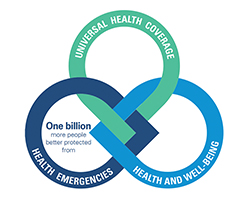Schutz vor gesundheitlichen Notlagen

The COVID-19 crisis has dominated public conversation as few health issues have done before. The commitment of communities and individuals to the collective response has proved essential. It has confirmed a widespread social consensus on the responsibility of health authorities for ensuring protection against health emergencies. Reliable risk communication has become a strategic responsibility, putting the spotlight of public scrutiny on the science and politics of public health and on the social accountability of public health expertise.
The COVID-19 crisis has also been – and still is – a transformative experience for WHO/Europe. The pandemic has shown the critical importance of acting rapidly and decisively. WHO has had to produce rapid and authoritative situation assessments, collate critical information reliably and credibly, and send out rapid response teams to assist national governments in a short space of time. It is too soon for a full, critical evaluation of the support provided to countries, but there is no doubt that the pandemic has transformed WHO’s presence in countries, its deployment of staff, its production of guidance, and its communication with Member States and regional and subregional institutions and clusters of countries. In addition, it has intensified the communication and collaboration between WHO regional offices and United Nations agencies.
Learning from this experience is relevant for post-COVID-19 crisis recovery and for tackling the public health challenges of its aftermath. It will also guide efforts by WHO/Europe to build capacity to support countries in preventing, detecting and responding to a range of health emergencies as well as to the risks associated with climate change, zoonotic diseases and antimicrobial resistance. WHO/Europe will also work to help ensure that essential health services, such as for noncommunicable diseases; mental health and psychosocial support; immunization; sexual and reproductive health care services; health promotion and disease prevention; and services for HIV/AIDS, tuberculosis, viral hepatitis and other communicable diseases reach the people most in need. A systematic and comprehensive review of the management of the COVID-19 crisis is therefore an essential part of the work on protecting against health emergencies. An in-action review is ongoing and will feed into the planned independent global after-action review set up to improve WHO governance. Some lessons have already emerged, including the need for a dual-track response that combines the emergency response with dedicated efforts to maintain continuity of access to care.
The COVID-19 crisis has highlighted the need for preparedness and prompt response, cooperation and solidarity, as well as for clearly defined command-and-control emergency response mechanisms and structures. This proved critical within countries, but also among clusters of countries. Country capacities have to be mobilized, but so do regional and subregional structures, capitalizing on the lessons learnt thus far.
This leads to a triple agenda:
- Learn lessons: expand the ongoing in-action review of the COVID-19 crisis into a formal review of the Region’s response to recent health emergencies
- Support country preparedness and response capacity
- Reinforce regional preparedness and capacity to respond, and produce the public goods required to manage crises



